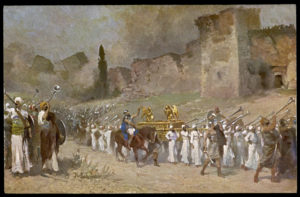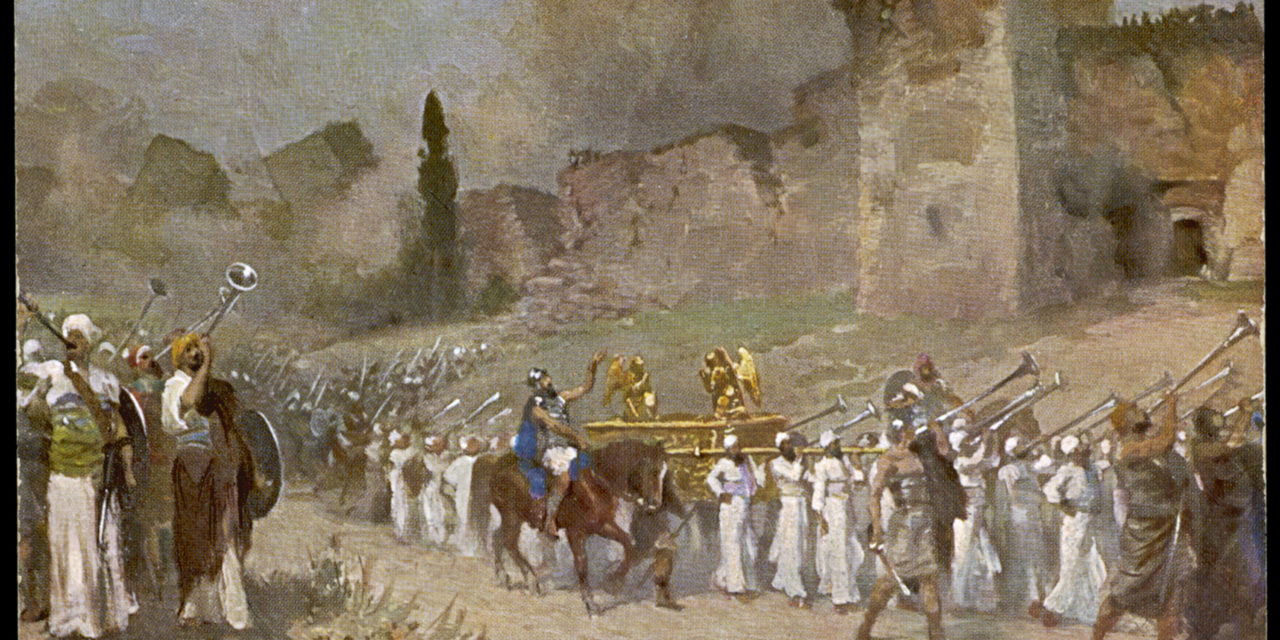Joshua: Training a Leader (Numbers 27:12-23)
By Dr. Jack R. Hodges, Jr.
Burke County
In an online article (insights.jmw.com) entitled, “Leaders Are Born, Not Made…and Other Popular Myths,” by JMV Consultants, the writers join others in questioning the “so-called” truth which has gained much popularity in modern times. They join countless others who see that leaders possess a special set of qualities which seem to be an intrinsic part of their personality. We often find lists of such qualities throughout our society: visionary, energetic, dynamic, fair, inspiring, courageous, charismatic, and so on.
The writers argue that “while these descriptions certainly capture something about leadership, they don’t get to the heart of it. It’s not that you wouldn’t use many of these words to describe strong leaders. The point is: these words describe what you see when someone is leading effectively. They are descriptions offered by observers – the people in the stands who are watching the game on the field. We suggest debunking the myth of born leaders: These qualities and behaviors are part of the result – not the genesis – of good leadership.”
I would contend that God’s people are both born and made to lead. Our calling as born-again believers, who are adopted by God as spiritual sons and daughters through faith in Christ, is to lead a broken, dark and lost world to the wonderful knowledge of the love of God in Christ Jesus. Our calling is to use each quality mentioned above (and so many more) to effectively invite and challenge those who are apart from God to place their faith and trust in Christ so that they can experience the goodness, grace, mercy, and amazing plans and purposes of their creator.
The Word of God abounds in men and women whom God has trained up to lead. One of those is Joshua. The first time we hear about Joshua is at Rephidim in Exodus 17. This is in the middle of the Exodus and during one of the stages of the journey when the children of Israel (Jacob) are facing an attacking Amalek army. Moses chooses Joshua as the military commander in the fight against the Amalekites. Joshua is the son of Nun, from the tribe of Ephraim (Numbers 13:8). His original name was Hoshea (Num. 13:16) but was changed to Joshua by Moses. But let’s backtrack to Moses before we go any further.
Earlier, Moses had reluctantly, but obediently agreed to go to Pharaoh and demand that he release the people of Israel from bondage and allow them to return to their own land (Ex. 3:7, 10). But fearing that Pharaoh will not listen to his plea because of the slowness of his speech and tongue, Moses begs the Lord to allow him to take Aaron along (Ex. 4:5). God’s anger burned against Moses for his unbelief, but eventually agreed to use Aaron as Moses’ mouthpiece. God’s power and might worked through them to create fear in Pharaoh and he finally let the people go. The Exodus commenced and God led them by the way of the wilderness to the Red Sea. We all know what happened there—Pharaoh and his army followed and were swallowed up in the sea trying to follow the children of Israel through the held-back waters. The wilderness journey continued, and it wasn’t long until the people were hungry and thirsty. God fed them and gave them water to drink all along the way. They ate manna for 40 years and God supplied water as they moved from spring to spring in the desert.
In Ex. 16:35 we read, “The sons of Israel ate the manna forty years, until they came to an inhabited land; they ate the manna until they came to the border of the land of Canaan.”
They came to an inhabited land. This place was referred to as Rephidim, a place which had no water to drink. The people found themselves in a difficult place in the journey. Although God continued to supply their needs, water was always an issue. But now, as they traveled into an inhabited region, a new threat existed. The Amalekites wouldn’t take kindly to such a huge movement of people. They threatened to attack, and Moses had to act swiftly to prepare them for such an attack.
That’s where Joshua came in. We have no historical data that would give us any insight into Joshua’s upbringing or training. Perhaps he had made a name for himself as a skilled lieutenant in the local Egyptian civil law enforcement. Perhaps he had done tours of duty in the Egyptian military. We don’t know. But clearly, he had become known as a man of skill and valor, of tactical wisdom, and of leadership. So, when Moses needed someone to lead the defense of the traveling nation, he didn’t turn to Aaron, his spokesman, he turned to Joshua. [Read Numbers 17:8-16]
From that moment on, Joshua held a special place in Moses’ heart and served him as a trusted advisor and commander. Moses saw his devotion, his valor, his focus, and his perseverance, and character. Joshua was at his side from that moment on.
When God summoned Moses to come up to Him on the mountain (Exodus 24:12), He had stone tablets to give him which contained the law and commandments. Moses rose up and took his trusted commander, Joshua with him. Moses needed a strong and trusted servant to help carry the precious stone tablets back to the assembly.
After the law and commandments were presented to the children of Israel, Moses pitched a tent outside the camp and would enter that tent to meet face-to-face with the Lord. We read in Exodus 33:8-11 that Joshua, his willing and able servant, would always go up with him and enter the tent by his side. When Moses returned to the camp, Joshua stayed to guard the holy tent of meeting. How amazing is that! Joshua was the only one, besides Moses, that was allowed to see the face of the Lord.
And then, as the children of Israel were nearing the land of Canaan, the “promised land” (Numbers 13:1-4a), the Lord commanded that Moses send out men who were leaders of each of the tribes of Israel. In Numbers 13:8, we see that Joshua (Hoshea) from the tribe of Ephraim, was chosen to lead this expeditionary force to spy out the land. The twelve leaders traveled to scope out the land and its inhabitants, to give a report of whether the land was good or bad, had strong or weak people, and had strong cities or not.
They went to the wilderness of Zin, into the Negev and Hebron, and to the valley of Eshcol. After 40 days, they returned and gave a report to Moses and the children of Israel. Although all agreed that the land was flowing with milk and honey, only Caleb and Joshua stood against the rest and declared that in spite of the stout resistance that the inhabitants of the land would surely offer, God would help them prevail (cf. Numbers 14:4-10).
Through every step along the pathway of deliverance, Joshua, the son of Nun, was there. And when the children of Israel, after many years of battles and challenges, finally reached the mountain of Abarim (Mount Nebo), which overlooked the promised land of Canaan—God informed Moses that he would not be going over into the land. His job was done! His watch had ended! He was to appoint Joshua as leader over the entire clan.
Why not Aaron? Why not Caleb or any of the other tribal leaders? Because God needed a warrior to lead them into battle—and Joshua had proven himself a faithful servant who had the heart of a warrior and the courage of a lion.
Joshua would lead them on the conquest. He would go out and come in before the people and lead them with a courageous and faithful heart (cf. Numbers 27:15-23). His dedication to the Lord was unequaled and his zeal for the Lord’s plans and purposes was unparalleled. Moses saw it—and so did the Lord God.
Regardless of what people say, leaders are made, not born. Gifted individuals must have training, hands-on experience, and good role models if they are ever going to realize their leadership potential. And that’s just what Joshua had. His physical and mental training and spiritual and social leadership development was forged under the most dangerous and life-threatening conditions. He built character, strength, resolve, and unwavering faith in and through the strenuous, demanding, critical, and hazardous conditions and settings.
But perhaps the “most valuable aspect of Joshua’s leadership preparation was the privilege he had of observing Moses in action,” writes the editors of the devotional, 365 Life Lessons from Bible People. As Moses’ personal aide, Joshua watched him navigate and deal with a rebellious and stubborn people. He saw Moses handle crisis and take care of both minor and major leadership challenges. And perhaps most importantly of all, Joshua got an insider’s look at Moses’ intimate, personal relationship with God.
Modern lingo would describe that kind of relationship as a mentorship. But I don’t believe that Moses brought Joshua to his side to mentor him. Rather, he appointed him as a skilled and useful military mind and muscle who was crucial to the work and plans of God. Moses recognized the value of including this young man as a partner to the miraculous, amazing activity of God. He probably saw in Joshua a raw leadership ability that was perfectly suited for the enormous task of delivering God’s people from slavery to freedom. Moses, in all likelihood, couldn’t and didn’t see Joshua being elevated to his place of leadership—but God did! And God needed this young man to see true faith and obedience in action. When the time and the circumstances were right, Moses heard the Lord and submitted to the will of the Lord God Almighty. He took Joshua and set him before Eleazar the priest, who laid his hands upon Joshua and commissioned him, just as the Lord had commanded.
I have been blessed along the pathway of preparation for ministry and service by godly men and women who recognized my heart, passion, and potential to serve the Lord. They gifted me with the privilege of walking alongside them as they faithfully served the Lord. As I walked beside them, I saw what genuine faith, deep devotion, and selfless sacrifice looked like. I learned the meaning of shepherding and the value of relationship. I practiced servanthood and humble obedience and waited for the Lord to use me and guide me. And that He did! To worlds, places, peoples, tongues, and opportunities that I could not even dream about. To God be the glory and honor forever and ever! Amen!
Perhaps you might consider finding and following alongside someone called and anointed by the Lord who leads with the heart of Moses, the passion of Elijah, and the love of Christ Jesus. Do so, not in order to climb the ladder of success or attain a position of leadership, but rather to serve God with the heart of a warrior and the courage of a lion. Perhaps, as a spiritual leader in your congregation, you might prayerfully consider taking on a Joshua. Discipling, grooming, equipping such a young man or woman for whatever marvelous plans the Lord may have for their lives? God bless each of you as you serve the Lord with gladness.
________________________________________________________________________________________________________________________
Dr. Jack Hodges is the Senior Pastor at Pleasant Hill Baptist Church in Morganton, NC. He has served as a pastor, a biblical counselor and an International Mission Boar missionary.
________________________________________________________________________________________________________________________







